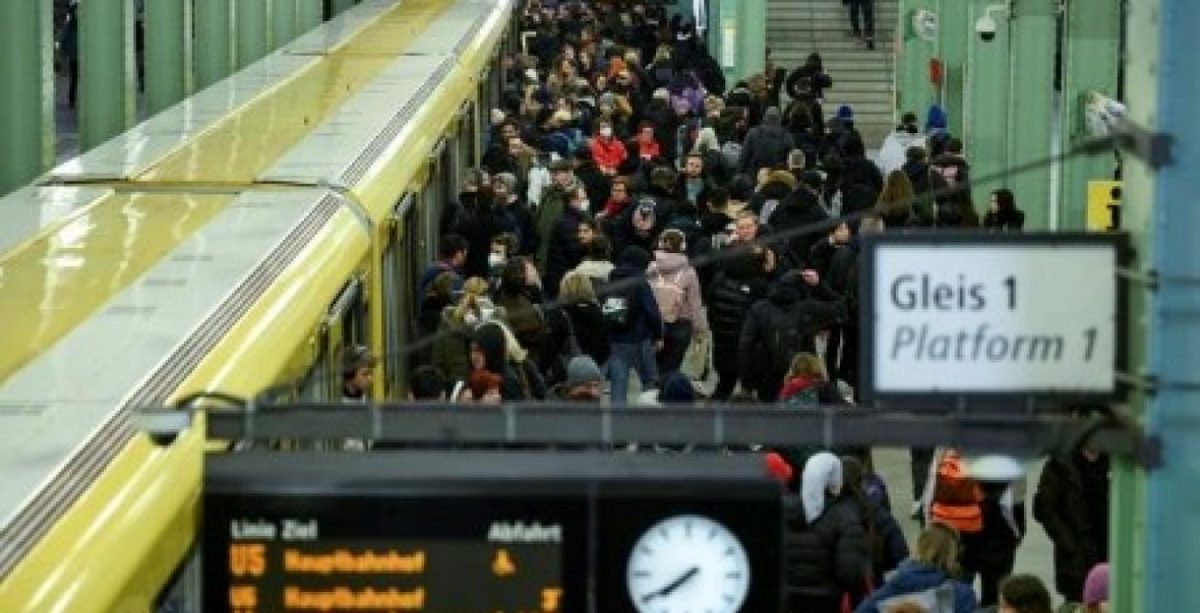BERLIN/FRANKFURT, (Reuters) – Airports and bus and train stations across Germany were at a standstill today, causing disruption for millions at the start of the working week during one of the largest walkouts in decades as Europe’s biggest economy reels from inflation.
The 24-hour strikes called by the Verdi trade union and railway and transport union EVG were the latest in months of industrial action which has hit major European economies as higher food and energy prices dent living standards.
Terminals were largely deserted as airports, including two of Germany’s largest in Munich and Frankfurt, suspended flights, while rail services were cancelled by railway operator Deutsche Bahn DBN.UL. Striking workers wearing yellow or red high-visibility jackets blew horns, sirens and whistles, held up banners and waved flags during protests.
The Airports Association ADV estimated that 380,000 air passengers were affected. In Frankfurt alone, almost 1,200 flights for 160,000 passengers were cancelled and stranded travellers slept on benches. In Cologne, the lack of city trains prompted a dash for taxis.
Employees are pressing for higher wages to blunt the effects of inflation, which reached 9.3% in February. Germany, which was heavily dependent on Russia for gas before the war in Ukraine, has been particularly hard hit by higher prices as it scrambled for new energy sources, with inflation rates exceeding the euro-area average in recent months.
Persistent cost pressures have pushed central banks to a series of interest rate increases, though policymakers have said it is too early to talk of a price-wage spiral.
Verdi is negotiating on behalf of around 2.5 million employees in the public sector, including in public transport and at airports, while EVG negotiates for around 230,000 employees at Deutsche Bahn and bus companies.
In the hours running up to the strike, both sides dug in their heels, with union bosses warning that considerable pay hikes were a “matter of survival” for thousands of workers.
“Millions of passengers who depend on buses and trains are suffering from this excessive, exaggerated strike,” a Deutsche Bahn spokesperson said on Monday.
Verdi is demanding a 10.5% wage increase, which would see pay rising by at least 500 euros ($538) per month, while EVG is asking for a 12% raise or at least 650 euros per month.
Stranded passengers expressed both sympathy and unhappiness about the strike action.
“Yes, it’s justified but I for one never went on strike in my entire life and I have been working for more than 40 years. At the same time, in France they go on strike all the time about something,” said passenger Lars Boehm.
Sharp wage increases would squeeze the fiscal room for manoeuvre for Chancellor Olaf Scholz’s government, making already fractious negotiations over the federal budget more difficult in his three-way coalition.
Employers are warning that higher wages for transport workers would result in increased fares and taxes to make up the difference.
Finance Minister Christian Lindner from the pro-business FDP is focused on reducing the deficit after higher spending during the pandemic and energy crisis.
A government spokesperson on Monday said politics should stay out of the wage talks, while Interior Minister Nancy Faeser expressed confidence that a solution would be found this week.
EVG chairman Martin Burkert warned further strikes were possible, including over the Easter holiday period.
“We have been dragged along here for too long. The big ones benefit and the small ones, who keep everything running, get nothing,” said striking worker Christoph Gerschner. “People have second or third jobs to make ends meet.”
Monday’s walkouts are part of waves of disruptive labour strikes in wealthy European countries in recent months including in France and Britain, where hundreds of thousands of transport, health and education workers are pressing for higher wages.
Protests against President Emmanuel Macron’s pension reforms have sparked the worst street violence in years in France.
Commerzbank Chief Economist Joerg Kraemer said the economic impact of Monday’s strike on Germany’s 181-million-euro ($194-million)-a-day transport sector was limited so far but this could change if the strikes persisted over a longer time.
“The strike will strain people’s nerves” and “damages the image of Germany as a business location”, he said. “But economically, the losses are likely to be limited to the transportation industry because factories will continue to operate and many employees will be working from home.”
The head of the Bundesbank, Joachim Nagel, said last week Germany needed to avoid a price-wage spiral.
“To be clear: Preventing inflation to become persistent via the labour market requires that employees accept sensible wage gains and that firms accept sensible profit margins,” he said.
“Despite signs of second-round effects, we have not observed a destabilising price-wage spiral in Germany so far.”
